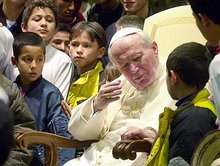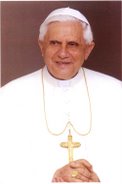By Cindy Wooden, March 15, 2007
Catholic News Service
ROME (CNS) -- When the pope, cardinals or bishops publicly comment on issues being debated by legislators they are not interfering in politics, but exercising their obligation as pastors and their rights as citizens, said an influential Jesuit magazine.
'When churchmen intervene in the public debate, they do so in ways and with instruments similar to those used by any other citizen,' said La Civilta Cattolica (Catholic Civilization) in an editorial reviewed by the Vatican Secretariat of State before publication.
The mid-March editorial used as its starting point the heated public debate in Italy over comments made by church leaders on proposed legislation recognizing unions formed by cohabiting couples, including homosexuals.
Church leaders have been accused of trying to impose the church's moral teaching on the laws of the nation.
The editorial said the church's critics complain 'habitually and only about those churchmen who publicly intervene in the debate and the merits of those questions which secularists consider to be the exclusive terrain of politics and administration.'
However, it said, the same people do not complain about public church campaigns to promote government policies and spending aimed at guaranteeing greater justice, charity and freedom.
'That which the secularists call interference the church calls 'the right to speak about the moral problems that today trouble the consciences of all human beings, particularly legislators and jurists,'' the editorial said, quoting Pope Benedict XVI.
While direct partisan political involvement is the competence of laypeople, the priests and bishops have an obligation to help them know and understand the relevant moral teachings of the church, the editorial said.
'Some say that in any case, the church and its agencies must abstain from addressing Catholic legislators,' the editorial said.
'But the church hierarchy cannot renounce making a statement, giving in to blackmail,' it said.
Particularly on themes such as the sacredness of human life and the value of the family founded on the marriage of a man and a woman, the editorial said, if the church did not speak it would not be fulfilling 'its obligation to give light and strength to the Catholic laity as the Second Vatican Council taught.'
Sunday, March 18, 2007
Jesuit magazine says church leaders obligated to comment on politics
Posted by
Anonymous
at
10:56 AM
![]()
Labels: Catechism, Catholic Politicians
Subscribe to:
Comment Feed (RSS)










|